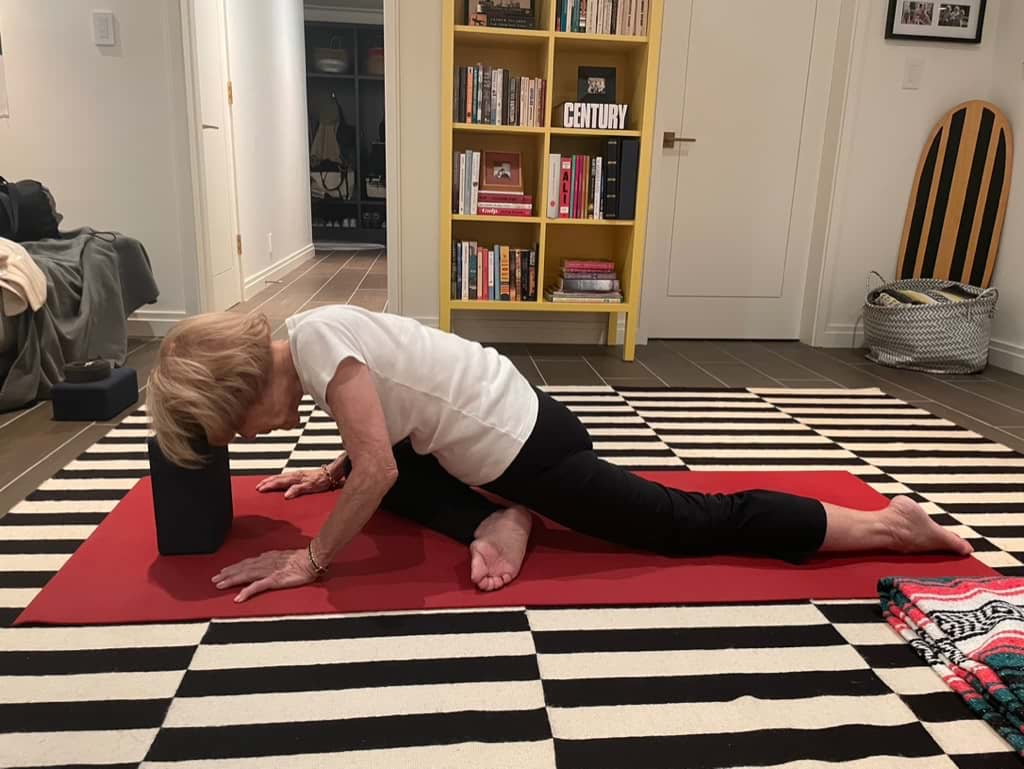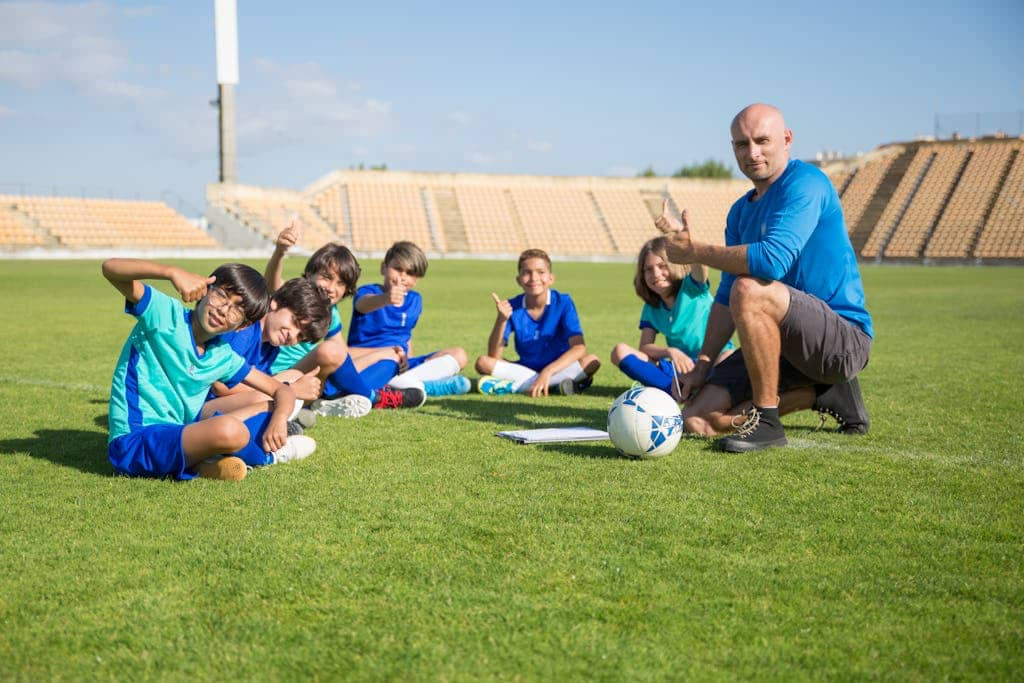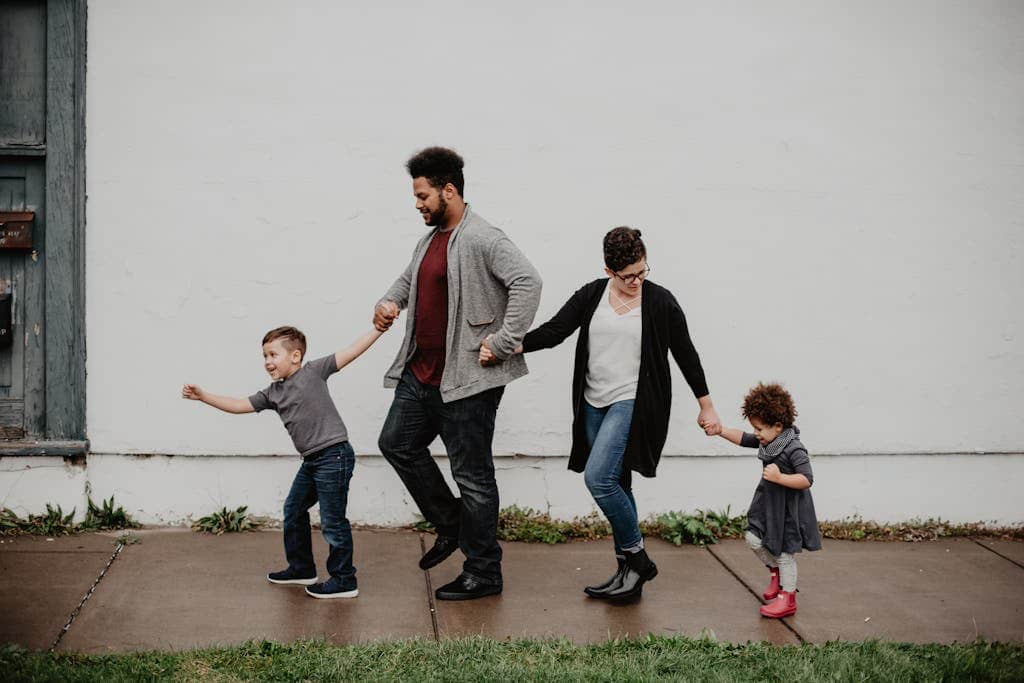Press PLAY to listen to this post.
My parents turned 80 this year. My dad is still the number 1 tennis player in the world in his age bracket. My mom is beautiful living healthy too. Neither of them do yoga. I wish they would! Their bodies and minds are changing. I can see it. I will be doing yoga when I’m 80. That’s for sure!
Aging is a natural part of life that brings with it a myriad of changes—both physical and emotional. As we grow older, maintaining our health and well-being becomes increasingly important. One practice that has gained popularity for its holistic benefits is yoga. Yoga, with its emphasis on flexibility, strength, and mindfulness, offers a gentle yet effective way to navigate the aging process with grace and strength.
The Physical Benefits of Yoga for Aging
1. Flexibility and Balance
One of the most noticeable changes as we age is a reduction in flexibility and balance. This can lead to a higher risk of falls and injuries. Yoga poses, or asanas, are designed to enhance flexibility by stretching muscles and improving joint mobility. Regular practice can help maintain and even improve range of motion, making daily activities easier and safer.
2. Strength and Stability
Muscle mass and bone density tend to decrease with age, which can lead to frailty and osteoporosis. Yoga incorporates weight-bearing poses that strengthen muscles and bones. Poses like the warrior series, plank, and tree pose engage various muscle groups, enhancing overall stability and strength.
3. Pain Management
Chronic pain, especially in the back, neck, and joints, is common among older adults. Yoga can help alleviate pain through gentle stretching and strengthening exercises that improve posture and reduce strain on the body. Additionally, yoga encourages relaxation and stress reduction, which can further help manage pain.
The Mental and Emotional Benefits of Yoga
1. Stress Reduction
Aging can bring about significant life changes, such as retirement, loss of loved ones, and health challenges. These changes can contribute to increased stress and anxiety. Yoga emphasizes mindfulness and deep breathing, which activate the parasympathetic nervous system, promoting relaxation and reducing stress hormones.
2. Cognitive Function
Engaging in regular physical activity, including yoga, has been shown to support cognitive function. Yoga practice encourages mental focus and concentration, which can help keep the mind sharp. Meditation and breathwork, integral parts of yoga, also support mental clarity and emotional balance.
3. Emotional Well-being
Yoga fosters a sense of community and connection, which can be particularly beneficial for older adults who may feel isolated. Group classes provide social interaction, while the practice itself encourages self-acceptance and compassion. This holistic approach can lead to improved mood and a more positive outlook on life.
Adapting Yoga for Older Adults
It's important to note that yoga is highly adaptable and can be modified to suit individual needs and limitations. Chair yoga, for example, offers seated poses that are accessible to those with mobility issues. Gentle yoga classes focus on slow, deliberate movements and deep relaxation, making them ideal for beginners and older adults.
Tips for Starting a Yoga Practice
1. Consult with a Healthcare Provider: Before starting any new exercise regimen, it's important to consult with a healthcare provider, especially if there are existing health conditions.
2. Find the Right Class: Look for classes specifically designed for older adults or beginners. These classes will focus on gentle movements and modifications.
3. Listen to Your Body: Yoga is about connecting with your body and understanding its limits. Avoid pushing yourself too hard and modify poses as needed.
4. Consistency is Key: Regular practice is more beneficial than sporadic sessions. Aim to incorporate yoga into your routine several times a week.
Aging is an inevitable journey, but it doesn't have to mean a decline in quality of life. Yoga offers a pathway to aging with grace, strength, and a sense of well-being. By incorporating yoga into your daily routine, you can improve your physical health, enhance your mental clarity, and cultivate emotional resilience. Embrace the journey of aging with yoga, and discover the profound benefits it can bring to your life.
P.S. If you want to do yoga with the grandkids, let us show you how. It’s so beneficial and fun!
Press PLAY to listen to this post.
Kids yoga offers numerous benefits for educators, including promoting physical activity, mindfulness, and emotional well-being among children. Plus, incorporating yoga into the curriculum can make learning fun and interactive. It's a great way to start the new school year with fresh ideas and enthusiasm! Here are some compelling reasons why this is beneficial:
Promotes Physical Activity: Yoga encourages physical movement, flexibility, and strength in children, which are crucial for their overall health and well-being.
Supports Mental Health: Yoga teaches mindfulness and relaxation techniques that can help children manage stress, improve concentration, and regulate emotions, leading to a more conducive learning environment.
Enhances Classroom Management: Integrating yoga into daily routines can help educators establish a positive and calming atmosphere in the classroom, reducing disruptive behaviors and promoting focus.
Engages Different Learning Styles: Yoga incorporates visual, auditory, and kinesthetic learning modalities, making it accessible and engaging for diverse learners.
Develops Social Skills: Group yoga activities promote teamwork, communication, and respect among students, contributing to a supportive classroom community.
Prepares for the School Year: Summer school allows educators to learn and practice new teaching strategies, ensuring they are well-prepared to implement kids yoga programs effectively during the upcoming school year.
By becoming certified in kids yoga, educators can enrich their teaching toolkit, cater to the holistic development of their students, and create a positive educational experience that extends beyond academics. It’s a wonderful way to promote a healthy lifestyle and mindfulness practices among children at every age.
P.S. Get the skills you need to have a calm and connected classroom in just 8 days or come in person. We’ll see you soon!
Press PLAY to listen to this post.
Summer school is a wonderful opportunity for coaches, parents and educators to attend specialized training like kids yoga teacher certification. It allows them to enhance their skills and prepare engaging activities for all ages. Coaches attending kids yoga teacher training and obtaining certification during summer can be highly beneficial for young athletes. Here’s how:
- Injury Prevention: Yoga promotes flexibility, balance, and body awareness, which can help reduce the risk of injuries in young athletes. Stretching and strengthening through yoga poses can complement the physical demands of sports training.
- Enhanced Performance: Yoga improves focus, concentration, and mental clarity, which are crucial for optimal athletic performance. It also enhances overall fitness, including strength and endurance, which can translate to better performance in sports.
- Mindfulness and Stress Reduction: Yoga teaches mindfulness and relaxation techniques that can help athletes manage stress, anxiety, and performance pressure. This can contribute to better mental resilience during competitions and training.
- Team Building and Cohesion: Yoga sessions can be a great way to foster team bonding and create a positive team culture. It encourages cooperation, respect, and support among teammates.
- Holistic Approach to Coaching: Integrating yoga into coaching practices demonstrates a commitment to holistic athlete development, addressing physical, mental, and emotional aspects of fitness and performance.
Overall, kids yoga certification for coaches during summer can contribute to a healthier, more balanced approach to sports training, benefiting young athletes both on and off the field or court.
P.S. Get the skills you need to level up performance in just 8 days or come in person. We’ll see you soon!
Press PLAY to listen to this post.
Summer school is a wonderful opportunity for parents, coaches and educators to attend specialized training like kids yoga teacher certification. It allows them to enhance their skills and prepare engaging activities for all ages. Parents attend kids yoga teacher training and become certified to teach yoga to their children at home. Here are several reasons why this can be incredibly beneficial:
- Health and Wellness: Teaching yoga to children promotes physical fitness, flexibility, and coordination. It also helps develop healthy habits from a young age.
- Emotional Regulation: Yoga encourages mindfulness and relaxation techniques that can help children manage stress, anxiety, and emotions effectively.
- Bonding and Quality Time: Practicing yoga together can strengthen the parent-child bond and provide a positive activity that the whole family can enjoy.
- Improved Focus and Concentration: Yoga teaches children to focus on their breath and body, which can translate to better concentration and academic performance.
- Life Skills: Yoga instills valuable life skills such as patience, perseverance, and self-awareness, which are important for personal growth.
- Holistic Development: By integrating yoga into daily routines, parents can support their children's holistic development, including physical, mental, and emotional well-being.
- Fun and Creative: Yoga sessions can be made fun and interactive, encouraging creativity and imagination in children.
By becoming certified in kids yoga, parents can create a healthier and happier home environment, where yoga becomes a part of everyday life. It’s a wonderful way to nurture well-rounded children who are equipped with tools for both physical and emotional resilience.
P.S. Get the skills you need to have a healthier and happier home in just 8 days or come in person. We’ll see you soon!




